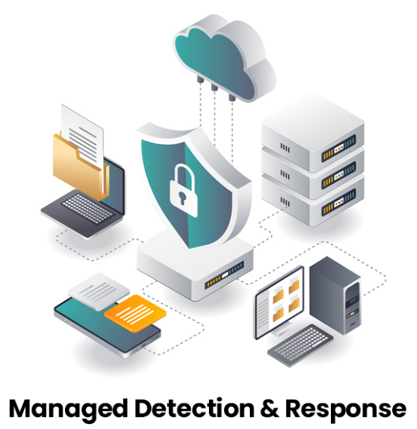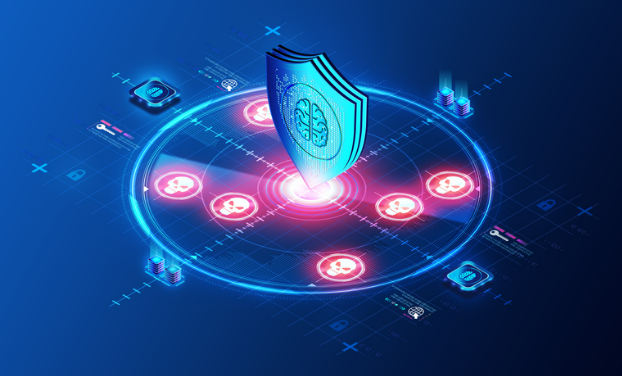Key MDR Features
Managed Detection and Response (MDR) services offer capabilities to enhance an organization's cybersecurity posture through proactive monitoring, detection, and response to threats. These features are critical for organizations seeking to mitigate the risk of cyber-attacks and manage the evolving landscape of cyber threats. Here are the key features that define MDR services:
Advanced Threat Detection
MDR services utilize sophisticated technologies and methodologies to detect advanced threats that traditional security measures may miss. This includes machine learning algorithms, anomaly detection, behavioral analysis, and signature-based detection mechanisms. MDR can identify signs of malicious activities by analyzing patterns and anomalies in network traffic, logs, and endpoint behaviors, including zero-day exploits, ransomware, phishing attacks, and insider threats. This advanced detection capability ensures that threats are identified early in the attack chain, reducing the potential impact on the organization.

Proactive Threat Hunting
Unlike passive security systems, MDR actively searches for hidden threats within an organization's environment. Threat hunting involves using sophisticated tools and techniques to search for indicators of compromise (IoCs) and indicators of attack (IoAs) that suggest a breach or an imminent threat. This proactive approach helps uncover stealthy threats that evade traditional detection mechanisms, ensuring that attackers cannot linger undetected within the network for extended periods.
24/7 Monitoring and Response
MDR services provide continuous, round-the-clock monitoring of an organization's IT environment. This is critical for the timely detection and response to cyber threats, as attacks can occur at any time, often outside of standard business hours. The 24/7 monitoring is supported by a Security Operations Center (SOC) staffed by cybersecurity experts who can quickly analyze alerts, differentiate between false positives and genuine threats, and initiate an appropriate response to mitigate risks.
Incident Response and Remediation
When a credible threat is detected, MDR services include rapid response capabilities to contain it and minimize its impact. This may involve isolating affected systems, applying patches, removing malware, and performing forensic analysis to understand the attack vector and prevent future breaches. Effective incident response and remediation are critical to restoring normal operations and ensuring that vulnerabilities are addressed to avoid recurrence.
Customized Security Posture
MDR services are often tailored to individual organization's specific needs and risk profiles. This customization allows for a more effective security posture that aligns with the organization's size, industry, regulatory requirements, and unique vulnerabilities. MDR providers can implement targeted security measures and monitoring strategies that offer the most protection by understanding the specific context and threats relevant to an organization.
Expertise and Guidance
MDR providers offer access to cybersecurity experts who can guide security strategies, compliance requirements, and best practices for threat mitigation. This expertise is invaluable for organizations needing more resources to maintain an in-house cybersecurity team. MDR teams are typically comprised of seasoned security analysts, incident responders, and researchers who can provide insights into the latest threats and trends in cybersecurity, helping organizations stay ahead of potential risks.
Integration with Existing Infrastructure
MDR services are designed to integrate seamlessly with an organization's existing IT infrastructure and security tools. This includes endpoint protection platforms, security information and event management (SIEM) systems, and other security controls. By leveraging and enhancing the organization's current investments in cybersecurity, MDR provides a more comprehensive and effective security solution that bridges gaps in the security landscape.
These critical features of MDR underscore its role as a comprehensive cybersecurity service that offers advanced protection against cyber threats. By combining technology, expertise, and a proactive approach to threat detection and response, MDR addresses the complexities of the modern cyber threat environment, providing organizations with the resilience to defend against and recover from cyber attacks.
Why is MDR Important?
In the rapidly evolving landscape of cyber threats, Managed Detection and Response (MDR) services have become a critical component of modern cybersecurity strategies. The importance of MDR can be attributed to several key factors that address the complex challenges organizations face in protecting their digital assets and maintaining operational continuity. Here are the main reasons why MDR is essential:
Increasingly Sophisticated Cyber Threats
Cyber attackers continuously refine their tactics, techniques, and procedures (TTPs) to evade detection and exploit new vulnerabilities. With the rise of sophisticated malware, ransomware, and advanced persistent threats (APTs), more than traditional security measures is needed to provide adequate protection. MDR services offer advanced detection capabilities and expertise to identify and neutralize these complex threats, ensuring organizations can defend against the latest cyber-attack strategies.
24/7 Protection in a Global Threat Landscape
Cyber threats do not adhere to a 9-to-5 schedule; they can occur at any time, any day of the week. MDR provides continuous, 24/7 monitoring and response capabilities, ensuring that threats are identified and addressed promptly, regardless of when they occur. This round-the-clock protection is essential for minimizing the window of opportunity for attackers to cause damage or exfiltrate sensitive data.
Resource Constraints and Skill Shortages
Many organizations, tiny and medium-sized enterprises (SMEs), need more resources and in-house expertise to manage their cybersecurity posture effectively. The cybersecurity talent shortage exacerbates this issue, making it difficult for companies to hire and retain skilled security professionals. MDR services address this gap by providing access to a team of cybersecurity experts who can manage threat detection, analysis, and response activities. This allows organizations to benefit from high-level security expertise without needing extensive internal resources.
Compliance and Regulatory Requirements
Regulatory environments across various industries are becoming increasingly stringent, with mandates that require organizations to implement robust cybersecurity measures and report on security incidents. MDR services help organizations meet these compliance requirements by providing comprehensive threat detection, response capabilities, and detailed reporting that can demonstrate adherence to regulatory standards. This is particularly important for industries subject to regulations like GDPR, HIPAA, or PCI-DSS, where failure to comply can result in significant penalties.
Reducing the Impact of Security Incidents
The impact of a cyber-attack can be devastating, leading to financial losses, reputational damage, and legal consequences. MDR services play a crucial role in minimizing the effects of security incidents by ensuring rapid detection and response. By quickly containing threats, MDR helps prevent extensive damage, data breaches, and operational disruptions, safeguarding the organization's assets and reputation.
Focus on Core Business Activities
Cybersecurity management can significantly burden organizations, diverting attention and resources away from core business functions. Organizations can focus on their primary objectives and growth initiatives by outsourcing threat detection and response to MDR providers, confident that experts are actively managing their cybersecurity posture.
Adaptive Security Posture
The threat landscape and organizational IT environments are constantly changing. MDR services provide the flexibility and adaptability needed to respond to these changes, ensuring that security measures evolve in line with new threats and technological advancements. This adaptive approach helps organizations maintain a robust security posture over time, even as their needs and the external environment shift.
MDR's importance lies in its comprehensive approach to cybersecurity, combining advanced technology, expert knowledge, and continuous monitoring to protect organizations against the increasingly sophisticated and relentless nature of cyber threats. By addressing the critical challenges of cybersecurity management, MDR enables organizations to strengthen their defenses, comply with regulatory requirements, and focus on their strategic goals with reduced risk of cyber-attack disruption.
Managed Detection and Response FAQ
A: MDR differs from traditional security services in several key ways. Traditional security services often focus on preventative measures, such as firewalls, antivirus software, and intrusion detection systems, which are essential but insufficient to combat sophisticated cyber threats. Conversely, MDR emphasizes proactive threat hunting, advanced detection, and rapid response to incidents. While traditional services may provide some level of monitoring, MDR offers 24/7 monitoring by a team of experts equipped with advanced tools to identify and respond to threats in real time. Furthermore, MDR services are typically more adaptive and customized to an organization's specific needs, providing a more comprehensive and dynamic approach to cybersecurity.
A: MDR services are designed to integrate seamlessly with an organization's cybersecurity infrastructure. This includes leveraging existing security tools, such as Endpoint Detection and Response (EDR) platforms, Security Information and Event Management (SIEM) systems, and other cybersecurity technologies. MDR providers work closely with organizations to assess their current security posture, identify gaps, and implement the MDR solution to complement and enhance their existing security measures. The goal is to create a layered security approach that maximizes the existing infrastructure's effectiveness and the MDR service's added capabilities, ensuring comprehensive protection against cyber threats.
A: Absolutely. Small and medium-sized enterprises (SMEs) can significantly benefit from MDR services, even more so than larger organizations. SMEs often face the same cybersecurity threats as larger entities but typically need more resources and in-house expertise to manage these threats effectively. MDR provides SMEs access to a team of security experts and advanced technologies that they might not otherwise be able to afford or work independently. This level of support helps level the playing field, allowing SMEs to defend against sophisticated cyber threats, comply with regulatory requirements, and focus on their core business activities without the burden of managing complex cybersecurity operations in-house.

